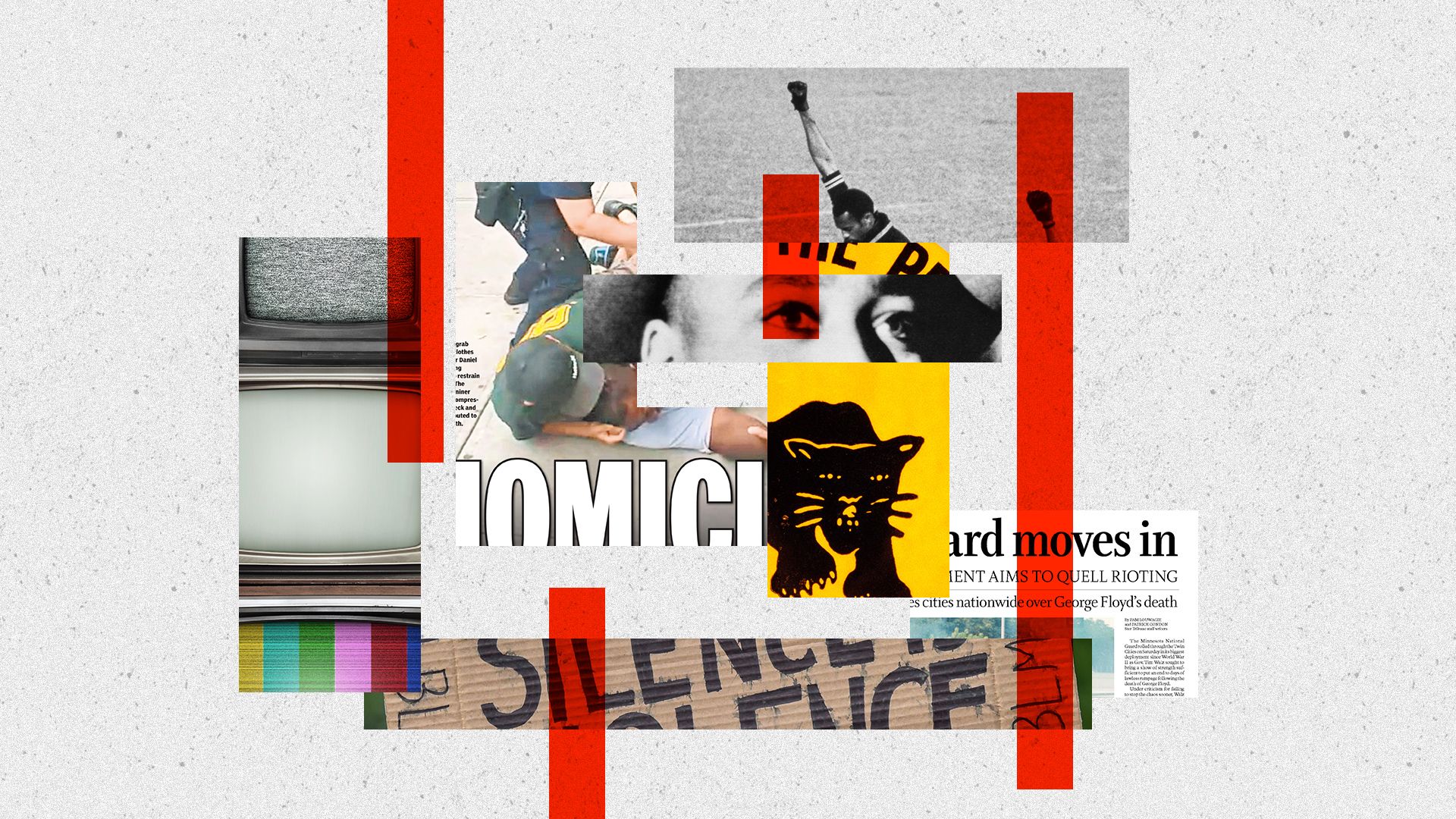Race's media moment
Add Axios as your preferred source to
see more of our stories on Google.

Photo Illustration: Aïda Amer/Axios. Photos: Photo by David J. & Janice L. Frent/Corbis via Getty Images, NY Daily News via Getty Images, Bettmann / Contributor, Dave Rushen/SOPA Images/LightRocket via Getty Images, Star Tribune via Getty Images.
Across every type of media — music, television, books, podcasts and more — messages about fighting systemic racism and driving social change are topping the charts and dominating the country's attention span.
Why it matters: Just as the late 1960s propelled new soundtracks, movies and shows about social justice, media today will serve as a lasting record of this moment in America's history.
Driving the news: Americans are craving content that addresses race as the nation faces a reckoning in the aftermath of George Floyd's killing. At the same time, material that doesn't meet today's standards of respect for racial justice is getting axed.
Music: Juneteenth, the holiday that commemorates the end of slavery in the United States, saw a slew of new musical endeavors that rode the charts.
- Beyoncé released a new song, Black Parade, on Juneteenth. The song focuses on black empowerment and references her own roots growing up in the South as well as reparations.
- Artists like Wale, Black Eyed Peas, Teyana Taylor and others all debuted new albums and songs on Juneteenth to commemorate the protests.
- A remixed version of Childish Gambino's 2018 hit "This is America" has become a viral anthem on TikTok to discuss police brutality against black people.
Television: U.S. TV demand for Netflix’s "Dear White People" grew 329% during the week of May 27-June 2, just as the nationwide protests were starting, per Parrot Analytics. Another Netflix show, "When They See Us," was up 147%.
- Both shows launched last year, but interest in them intensified after Netflix launched a "Black Lives Matter" collection, promoting over 45 titles about racial injustice and the experience of black Americans.
- At the same time, reality shows about police officers — including "Cops" and "Live PD" — have been canceled for glorifying police violence.
- ABC's sitcom "Black-ish" has been moved up to return in the fall to address the current climate.
Movies: Several films on Netflix with black themes are receiving traction, thanks in large part to Netflix's new collection, including Spike Lee’s newly released film “Da 5 Bloods” and Ava DuVernay’s documentary “13th."
- Still, streaming services find themselves having to cancel old films that now feel out of touch.
- HBO Max, the streaming service from AT&T, temporarily removed “Gone with the Wind” from its library earlier this month. Last week it said it would bring back the film with a newly added introduction by black scholar and Turner Classic Movies host Jacqueline Stewart that addresses its "historical context."
Books: Best-seller lists from Amazon, Barnes & Noble's and The New York Times have been dominated almost entirely by books on race over the last few weeks.
- Books about race topped both nonfiction and fiction lists, meaning consumers don't just want to learn historically about the issue but want to engage with it more deeply on an emotional level.
Podcasts: Podcasts about race have also been climbing the charts, according to podcast expert Nick Quah.
- As of June 9, the top podcasts on Apple's charts included The New York Times’ 1619, about the history of slavery in America; NPR's Code Switch, about race and identity; and Crooked Media’s Pod Save the People, which discusses race and social justice.
Gaming: In the gaming world, video games that long glorified violence or police brutality are starting to make changes.
- Fortnite, a popular game from Epic Games, removed police cars in light of the conversation around police brutality, the Wall Street Journal reported Sunday.
The irony: Many institutions in the media and entertainment industries are still struggling to address their own shortcomings around race and diversity.
- Top editors across multiple newsrooms have stepped down following protests from within their newsrooms over actions, words or coverage of race and Black Lives Matter.
- The Academy of Motion Picture Arts and Sciences said last week that it is working to ensure that films eligible for Oscars meet an array of diversity and inclusion requirements.
The bottom line: Our media diets now are a reflection of the nation's new attention to the Black Lives Matter movement and the role of the police, prisons and systemic racism — and they will help create a record of national sentiment in a watershed moment in American history.
